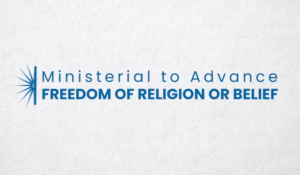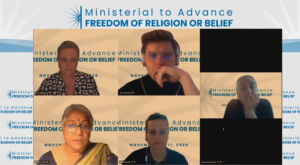Being in the “Virtual” Room: The 2020 Ministerial to Advance Freedom of Religion or Belief

Earlier this week religious freedom activists and faith-based organizations gathered virtually from around the world for the third Ministerial to Advance Freedom of Religion or Belief. In 2018 and 2019 the Ministerial to Advance International Religious Freedom was hosted by the US State Department in Washington, DC and both events were the largest state-sponsored human rights gatherings in our country’s history. This year’s event (renamed to use the nontheist-inclusive and internationally-preferred term of “freedom of religion or belief”) was hosted by Poland at the US State Department’s invitation, and after some scrambling and postponements due to COVID-19, it was finally held virtually this week and AHA staff was able to participate.
If your brain got caught up at “Poland” and “religious freedom” being used in the same sentence, you are right to be confused. Humanists International’s Freedom of Thought Report names severe discrimination in Poland against humanists and religious minorities. And while our State Department and its International Religious Freedom Office emphasize blasphemy laws as grave threats to human rights around the world, Poland not only has a strict blasphemy law for which the penalty is imprisonment, but the law is enforced regularly. Only a few months ago, for example, Elzbieta Podlesna was arrested and charged with insulting religion because of her painting of the Virgin Mary with a rainbow halo in support of LGBTQ rights. And throughout the year, Poland’s draconian abortion laws and “LGBT free zones”—both of which are intricately tied to the Catholic Church’s control within government—have made international headlines. Yet the State Department handed hosting of the ministerial over to Poland when it could have tapped any nation in the world. That should be an embarrassment to all Americans.
This surrealism was evident throughout the event.
Participating dignitaries from other countries could be forgiven for coming away from the event confident that the United States is a Christian Nation and that there is, indeed, a religious litmus test for serving at the highest levels of the US government. Every representative of US government entities made their faiths clear. US Secretary of State Mike Pompeo, to no one’s surprise, used his opening remarks to urge attendees to “pray for our success,” and when Ambassador-at-Large for International Religious Freedom Sam Brownback opened the event on its second day he affirmed that “each of us has the god-given right to follow our conscience,” and he closed his remarks with the “all-American” phrase “god bless you all.” While fairly common in domestic speeches, these lines were in stark contrast to the vast majority of remarks made by the other countries in attendance. And when representing the interests of Americans on an international stage, those rhetorical choices should have no place as they contradict the values outlined in the First Amendment of our constitution.
Throughout the diplomatic pomp and circumstance, there were few mentions of humanists or nontheists and even secularism, but they did occasionally happen. Each participating country had an opportunity to make remarks on the first day. Stef Blok from the Netherlands—again unsurprisingly—focused much of his allotted time on the rights of atheists and agnostics. However, he was also the only delegate to have his feed cut off mid-speech. Representatives from Sweden and France also made a point to include nonbelievers in their remarks, and following France’s emphasis on protecting our rights, the representative from the Council of Europe took a minute to uplift the French speaker’s inclusion of nonbelievers. That is notable, and represented a theme throughout both days of the event. When one speaker started to emphasize nontheists, following speakers would change their remarks in real time to include us. That’s significant.

A virtual panel discussion during the second day of the 2020 Ministerial
When the first Q&A session started on the second day, the first question (perhaps pejoratively) was, “How important is it to protect the rights of people who do not believe in a higher power? Is it equally as important as protecting the rights of believers?” It was also the first question posed in the second panel of the day. And both times, it dramatically shifted the language of every panelist. From that point on, nonbelievers followed every mention of believers in each panel. And for a speaker to shift their language from not mentioning nonbelievers to including them as a fixed phrase in “believers and nonbelievers” is meaningful for our visibility and fights back against the very real erasure we experience in freedom of religion and belief conversations and work.
Lastly, there was one very real breath of fresh air in the form of Shireen Huq, a Bangladeshi feminist who said the following during a panel discussion on how faith-based entities can engage in this work:
“I would like to emphasize however that this freedom [–the freedom of religion or belief–] must clearly and unequivocally include the freedom to not subscribe to any religion or religious belief…All too often the concern with minority points of view and belief, safety, and security are limited to religious minorities. Agnostics and atheists are perhaps the most minoritized of beliefs and of groups. The concern with engagement of faith-based organizations therefore raises for me the fear of a further shrinking space for those without religious beliefs. At a time when the world is plagued with religious bigotry on the one hand and religious extremism on the other, are we not better off excluding religious groups from state and public affairs?”
Within two days of diplomatic nuance and a constant narrative of how important faith-based organizations are to protecting human rights, Huq’s words were a bolt of lightning worth repeating. She not only included our community in the conversation, but she took it a step further to suggest the implications of doing so.
Advancing freedom of religion or belief in the world is a goal the American Humanist Association (AHA) unequivocally supports, but this year’s ministerial reaffirmed that our definition of this freedom isn’t shared by all. How countries interpret this essential human right can have disastrous effects on the liberty and health of their populaces. Looking ahead, it’s unclear if the Ministerial will continue under the Biden Administration, and if so, what form it will take. Whatever happens, though, the AHA will continue to be in the room to ensure our view and our constituency are included and uplifted.
